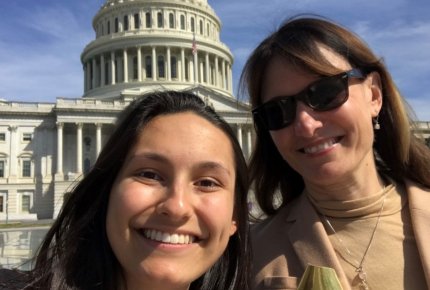Each September, ACS CAN joins patients, survivors, caregivers and public health advocates to recognize Childhood Cancer Awareness Month to elevate issues critical to the childhood cancer community. 15,000 children under the age of 19 will be diagnosed with cancer this year. We take this month as a time to not only highlight what we’ve achieved in the fight against childhood cancer, but, more importantly, to identify new ways we can improve outcomes for childhood cancer patients and help survivors thrive.
ACS CAN has taken notable steps to make childhood cancer a priority issue in Congress. We’ve joined forces with the Alliance for Childhood Cancer for the past 8 years for the annual Childhood Cancer Action Day on Capitol Hill, and last year our staff and volunteers successfully advocated for the passage of the Survivorship, Treatment, Access and Research (STAR) Act, a comprehensive bill that advances childhood cancer research and increases transparency and expertise for research at the National Institutes of Health (NIH).
While these investments in research have led to improved treatments for certain types of childhood cancer, side effects of these treatments can continue to affect quality of life for childhood cancer patients and survivors for their entire lives. Treatment toxicities still can cause a majority of childhood cancer patients to experience distressing side effects and late effects that cause significant suffering throughout their lifetime. To improve quality of life for childhood cancer patients and their families, pediatric palliative care can be provided by a coordinated team of doctors, nurses, social workers and child life specialists as a way to manage symptoms, improve communication and offer an extra layer of support throughout the cancer journey. Palliative care is appropriate at any age and any stage of the disease, and can be provided alongside curative treatment as an essential part of a patient’s care.
ACS CAN New Mexico volunteer Dr. Janis Gonzales is both a pediatrician and the mother of a childhood cancer patient, so she knows better than most how valuable palliative care is for families facing a pediatric cancer diagnosis. Dr. Gonzales lost her daughter to leukemia at the age of two and a half. Pediatric palliative care wasn’t widely available in New Mexico at the time of her daughter’s cancer journey in 2004, so her family spent her last few weeks in the hospital rather than at home. Since then, Dr. Gonzales has advocated to establish a pediatric hospice program at the University of New Mexico Hospital to better offer support to children with serious illnesses and their families. 
We’re grateful to have advocates like Dr. Gonzales who are dedicated to advancing issues so important to the childhood cancer community. This past March, she and her daughter Liesl joined ACS CAN on Capitol Hill to ask lawmakers to support the Palliative Care and Hospice Education and Training Act (PCHETA), a federal bill that would establish Palliative Care and Hospice Education Centers to improve training for health professionals, establish a national campaign to inform patients, families and health professionals about the benefits of palliative care and direct NIH funding to improve the delivery of palliative care. Advancing PCHETA through Congress is a top priority for ACS CAN; every childhood cancer patient, survivor and their loved ones deserve the best quality of life possible.
We’re proud to join the cancer community this September in recognition of Childhood Cancer Awareness Month and will continue to focus our advocacy efforts year-round to improve the diagnosis, treatment and quality of life for childhood cancer patients and survivors.

